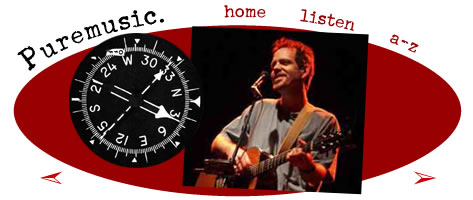
A Conversation with David Wilcox (continued)
PM: You and Richard Thompson, to me, have the best acoustic guitar sounds I've heard on the stage.
DW: [laughs] And they're so different. They're completely different. That's great.
PM: Very different.
DW: Richard just plays the Sunrise through the Mesa Boogie preamp, so he gets that sort of electric sound.
PM: He plays it through a Mesa Boogie preamp?
DW: Oh, yeah, a tube preamp. And it's from the UK, so it runs on 220, and so he's got this big power adapter up there. And it's a very electric sound. It's compressed, and it's got just a wonderful punch to it. And my sound is, you know…
PM: So warm and…
DW: Sort of hi-fi, comparatively.
PM: Yeah.
DW: And yet it's bigger in the way that it's got much lower frequencies, and it's got some higher crispier frequencies. And it is gentler in many ways. It doesn't have the same punch. And yet it's so much more…oh, I don't know, symphonic I'm thinking. [laughs]
PM: Oh, yeah, much more hi-fi, as you said. Because when I saw Richard, I thought he was using that big fat Sunrise preamp on the stage, you know the one that Kaufman makes, that little forty-pound transformer deal.
DW: That's an amazing piece of gear.
PM: Yeah. When I saw him, he had this one real tall blond guy who did his sound, and he walked in with a Haliburton and inside was the big Sunrise transformer, and he mixed the show. I managed sales for Mesa Boogie for, oh, a decade or so. And so I'm amazed to hear he's playing with a Mesa Boogie preamp.
DW: Well, actually, my information is probably a year and a half old, so I don't know.
PM: Yeah, mine is older.
DW: Oh, okay.
PM: Jeez, your rig is so pristine. It sounds so amazing.
DW: Thank you.
PM: Is it a trade secret?
DW: Oh, no.
PM: Are there any aspects of it that you might disclose?
DW: Sure. If people want to know about my sound, they can just call Greg at Pendulum Audio, and he can send them, in a box, this very sound that I'm getting.
PM: Really?
DW: Yeah.
PM: Oh, I know Greg. I'm going to call him right up, because I'm a Pendulum Sunrise guy.
DW: Yeah.
PM: Okay. Well, then we'll just keep that between us.
DW: [laughs]
PM: Are you using a few or many tunings?
DW: Fewer now, actually. I've finally found one that for me does everything I want it to do. And it was a long time coming. But open G with the third in the bass, with a cut capo that lets the bass string pass through. That is such a versatile tuning to me. I can play it out of five different keys, and it's just fascinating. And all the bass notes that you need, the two, four, five, six, they're all within easy reach, so you can stay close to the melody notes, sort of first and second position, and still play all the bass notes that you need. It's just wonderful.
PM: Thanks, that's valuable. I'm glad I got that on tape so I can go and figure it out later, all that you said.
DW: Yeah.
PM: You don't ever play in regular Spanish tuning, do you?
DW: It's the weirdest of all tunings! I go there once in a while when I really want to get lost.
PM: [laughs] After all the big or medium labels you've been with, A&M, Koch, Vanguard, how did this new partnership with What Are Records come about? What's that story?
DW: Oh, they're a fun label. I think they're doing what will probably become more common. It's a very different kind of a record deal, one that takes into account how the industry has changed. Instead of the company taking all the money, basically, they have a wonderful fresh outlook on what a record company can provide. Now that people can make their own records very cheap, and you can deliver an album, you know, graphics done, and enter the contract not in debt, then you can negotiate how much you want to spend for what. There's no hidden cost. And you don't have to audit the record company. What Are Records are just really good at what they do. It's more like having a record company work for you, instead of selling the master to them and…
PM: Becoming a slave in the process.
DW: Yeah, yeah.
PM: I thought it must be that they are a more open book, and a better deal. And part of the story seemed to be that they are dealing rather strictly with artists who have already attained a certain level of notoriety. So for people who are in that category, that's a great thing.
Speaking of open books, what are you reading? And what have you been listening to lately, aside from John Mayer? continued
print (PDF) listen archives puremusic home